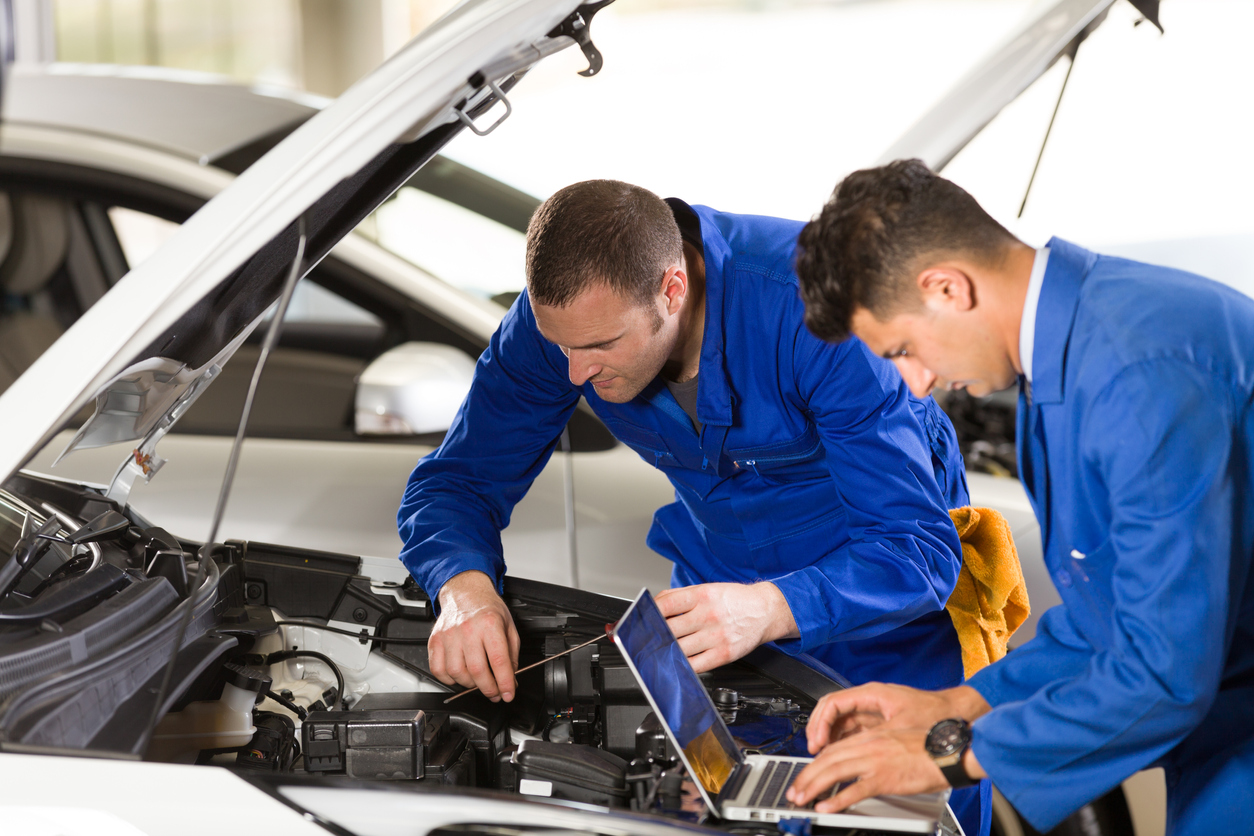They meant someone who understood cars and could diagnose issues. Both a mechanic and an automotive technician could run some tests, take a closer look, and make sure you’re safe and functional for the road.
However, as vehicles have evolved, so too have the roles related to maintaining them. Today, the difference between a mechanic and an automotive service technician has become significant, and one you’ll want to know about should you decide to get your car worked on or to work on cars.
What Is the Difference Between a Mechanic and an Automotive Technician?
The difference between a mechanic and an automotive technician is the difference between an engine and a computer. A mechanic is someone who can take apart every moving part and mechanical component of your vehicle and put it back together. An automotive technician, however, is someone who can diagnose and repair the computerized elements of modern vehicles.
Every auto body shop today now needs both automotive technicians and mechanics to fully service the latest models, which comprise both mechanical and computerized systems that rely on each other for optimal performance.
The Computerization of Modern Cars
In the past twenty years, cars have become more and more computerized. At first, it was computer features in the background — a system of sensors and safety features represented only by small lights in the dash. Then came electronic car features like keyless startup, auto locks, parking lot starts, or engine warmup with a click of the key fob.
Today, cars are built with thousands of microchips and are controlled by tablets and computers first and foremost, with engines as a secondary system reliant on the computerized controls. In fact, it is nearly impossible to buy a car today that does not have an integrated computerized system with advanced safety features. Even traditional-looking dashboard controls are computerized on the back end.
Technicians vs. Mechanics on an Essential Level
When you think about the difference between a vehicle technician and a car mechanic, a technician is someone who works on the computerized elements while a mechanic works on the mechanical elements. This reflects the computerized world we live in today, where technicians have become essential to operating everything from your work computer and smartphone to the computer inside your car.
We still rely on mechanics to make sure our engines, wheels, axles, and other mechanical elements of a vehicle work properly. Vehicle mechanics are essential, but they can no longer work alone. Being able to take a car apart and put it back together no longer covers 100% of a vehicle’s operating or control capabilities.
What an Automotive Service Technician Can Do
An automotive technician handles all of the computerized elements of a vehicle. When it comes to working on vehicles, computer technicians are necessary to troubleshoot issues with a vehicle’s dashboard tablet, entertainment systems, advanced safety features, sensors, and computerized controls.
- Ignition Systems and Diagnostics
- Modern vehicles do not start without authorization from a computerized system. From keyless fobs to safety sensor checks, an automotive service technician is required to determine what is going on with ignition systems and to run diagnostics on each vehicle’s core feature performance that will allow ignition to start safely.
- Exhaust and Emissions
- Checking emissions is a two-part process involving both internal readouts and direct testing of the outflow from a combustion vehicle. An automotive service technician knows how to run these checks and certify that a vehicle is efficient enough for state inspection standards.
- HVAC and Electrical
- Electrical issues are also under the authority of an automotive service technician, along with the controls and performance of the internal heating and cooling (HVAC) system. A technician will run tests on the electrical system and can diagnose problems with the AC or heat.
- Suspension, Steering, and Braking
- Service technicians are also trained in some of the basics of car mechanics in order to maintain well-rounded vehicle maintenance skills. These include suspension, steering, and braking. This is especially important considering that the latest safety features like dynamic cruise control and emergency braking are computerized.
- Automatic and Manual Transmissions
- Most vehicles today are automatic transmission, a process of choosing the correct gear based on the driver’s speed and road conditions, but an automotive service technician can diagnose issues with both automatic and manual transmissions.
- Automotive Engine Repair
- Technicians may also be versed in the inner workings of modern engines and how to repair them.
What a Vehicle Mechanic Can Do
A vehicle mechanic handles everything about a vehicle that is still mechanical. Considering that these are large chassis propelled by combustion engines and wheels on axles, mechanical elements are still essential.
- Diagnose Issues With a Car’s Mechanical System
- A mechanic can identify if there is a problem with a car\’s mechanical systems, as these systems still require repairing by someone with mechanical skills and training.
- Repair Car’s Engines, Belts, and Suspension
- Mechanics then repair these systems including a car’s engine, belt, axles, suspension, and so on.
- Repair Bent Panels, Axels, and Wheels
- Mechanics are the people who repair vehicle parts when they are bent and damaged by impacts or road flaws. Bent exterior panels, bent axles, and bent rims are repaired by mechanics.
- Install Car Mods
- Car mods, which involve modifying the exterior and physical elements of a vehicle, are typically taken care of by car mechanics instead of vehicle technicians.
- Repair Windshields, Windows, and Mirrors
- Mechanics also take care of the glass work for vehicles including windshields, windows, and mirrors.
Becoming a Vehicle Service Technician with Southern Careers Institute
In the modern automotive industry, vehicle service technicians are an important part of every dealership and auto shop. If you are a mechanic looking for career advancement, becoming a service technician can fully round your skills and allow you to work on both the computerized and mechanical aspects of modern vehicles. If you are good with computers and interested in vehicles, you can get your foot in the door by troubleshooting the computerized systems in the latest vehicle models.
Discover your potential as a vehicle service technician at Southern Careers Institute. SCI’s automotive service technician apprenticeship can train you on the skills needed to pursue this career path. Contact us to learn more today.










